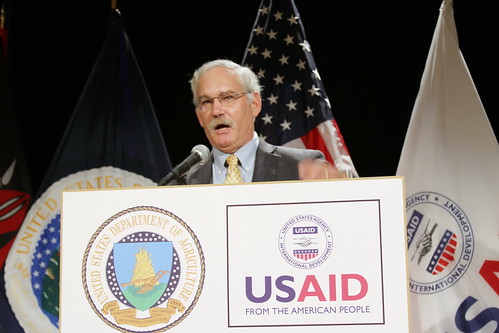The USDA and the U.S. Agency for International Development (USAID) have once again joined forces to collaborate with individuals and organizations that feed hungry people, promote sustainable development and provide technical assistance around the world. This is the thirteenth year of the International Food Aid and Development Conference, and I was proud to deliver keynote remarks here in Kansas City, Mo. Nearly 600 people from more than 25 countries discussed what has worked, what has not, and what we can do in the future to improve our food assistance and program delivery.
The U.S. government’s international food assistance programs will benefit 5.2 million people in the developing world this year. The challenges of global food security are enormous -- nearly one billion people are malnourished, and this number will likely grow as the world population continues to rise. Meanwhile, the United States, like many other nations, is facing serious budget pressures. In addition, commodity prices and demand continue to rise, squeezing food assistance dollars further.
In Kansas City, I shared the stage with many distinguished speakers, among them Bangladesh’s and Mozambique’s Ambassadors to the United States; USAID’s Administrator Raj Shah; and the U.S. Department of Transportation’s Maritime Administration Deputy Administrator. In addition, we recognized the President of Catholic Relief Services Ken Hackett for his 40-year contribution to alleviating global poverty and hunger.
Over the past two days, we discussed how we can take our programs and our partnerships to the next level—how we can better coordinate and target our efforts with limited resources, embrace innovative approaches to improve the quality and nutritional content of U.S. food aid products, reduce post-harvest losses, manage the effect of food and transportation prices on food assistance, enhance our global food security efforts through public-private partnerships, and increase the long-term sustainability of our programs.
While we acknowledge the challenges we face, this conference serves as a means to celebrate our successes and provide insight into new and innovative ways that we can work smarter, while providing food assistance to some of the world’s poorest people. I am proud of the work we are doing together and individually to answer the call of those in need and share our bounty with those less fortunate.

